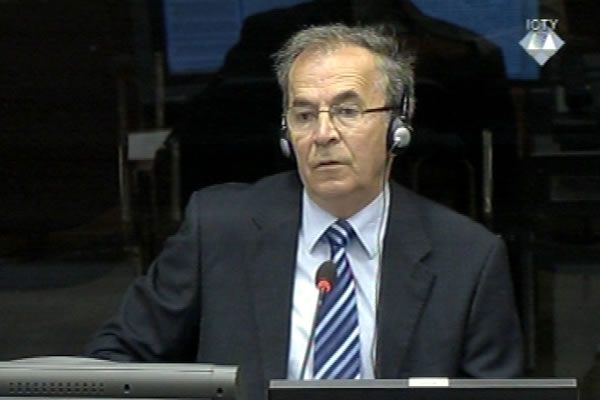Home
NON-SERB PATIENTS IN SERB HOSPITAL
Through Milan Pejic's evidence, Ratko Mladic’s defense wants to prove that the accused knew that that the wounded and the sick ethnic Muslims and Croats were treated in the Serb hospital in Blazuj and did nothing to prevent it; according to the defense, this shows Mladic did not intend to commit crimes against non-Serbs in BH
 Milan Pejic, defence witness at Rako Mladic trial
Milan Pejic, defence witness at Rako Mladic trial Until the war in BH, Dr. Milan Pejic worked in the Kosevo Hospital in Sarajevo as an ear, nose and throat specialist. In May 1992, Dr. Pejic went to the territory under the Serb control and became the chief of the hospital in Blazuj. In his statement to Ratko Mladic’s defense, as well as in his previous evidence as Radovan Karadzic’ defense witness, Pejic described what he did as a medical doctor during the war.
In his evidence, Pejic claimed that the wounded and sick persons were treated in the Serb hospital in Blazuj regardless of their ethnicity and religion. Amid the Croat-Muslim conflict in 1993, about 150 wounded Croats from Kiseljak were admitted in the hospital, the witness recounted. This prompted the presiding judge Orie to note that the relevance of that part of the evidence was questionable. Mladic is not on trial for ‘not providing help to non-Serb patients’, the presiding judge said, but for the gravest war crimes. The defense counsel replied that they wanted to show the state of mind of the accused during the war. According to the defense, there was no intent to commit crimes because medical assistance was given in the territories under the Serb army control to the members of the ethnic groups targeted, as the prosecution alleges, by the accused.
The witness noted that Mladic knew about the Croats and Muslim being treated in the Blazuj hospital. Mladic never issued any order or instructions to put a stop to it. On the contrary, Pejic said, Mladic visited the wounded several times and wished them all regardless of their ethnicity a quick recovery.
In the cross-examination, prosecutor Abeer Hasan noted that Ramiz Mujkic, a Muslim prisoner, was treated in the Blazuj Hospital from 8 to 22 August 1992. In his evidence at Radovan Karadzic's trial, Mujkic described how he had been wounded in the leg, detained and abused in the Rajlovac military barracks. His captors beat him on the wound.Military police escorted Mujkic on his way in and out of the Blazuj Hospital. Mujkic was then detained in Planjina Kuca.
Dr. Pejic explained that he personally insisted that everything should be done to save Mujkic’s leg, rather than to amputate it. The leg was saved and Mujkic purportedly thanked the witness after the war. The witness neither denied nor confirmed that Mujkic had arrived under military police escort. Also, Dr. Pejic didn’t specify where Mujkic was before and after his hospitalization. When the prosecutor asked Pejic ifMujkic’s discharge letter specified that his wound showed evidence of blows inflicted after the actual wounding, Pejic answered that in war conditions medical doctors ‘didn’t fill in the details of injuries’. Also, the doctors were not forensic experts and could not establish why a patient’s wound ended up being neglected and infected.
Asked if he knew about civilian casualties in the part of Sarajevo under control of the Bosnian authorities, the witness replied that his knowledge was based on media reports. Dr. Pejic could neither deny or confirm that the Serb artillery and snipers attacked the city. The only thing he knew was that the Serb civilians were killed in the BH Army attacks on the parts of the city under the Bosnian Serb military control.
As the hearing continued, Zoran Kovacevic began his evidence in Mladic’s defense. Kovacevic was a platoon commander in the Bratunac Brigade during the war.
Linked Reports
- Case : Mladic
- 2014-07-22 NO INVOLVEMENT IN RIVER JADAR CRIME
- 2014-07-21 NO CRIMES IN FOCA…ONLY CRIMINAL OFFENSES
- 2014-07-18 WHO RAPED WOMEN IN FOCA: WITNESS OR HIS NAMESAKE?
- 2014-07-24 WITNESS: WE AVOIDED MLADIC LIKE PLAGUE
- 2014-07-24 DOUBLE GENOCIDE REMAINS IN MLADIC’S INDICTMENT
- 2014-08-25 DID SERBS ASSIST CROATS FOR HUMANITARIAN OR OPPORTUNISTIC REASONS?
